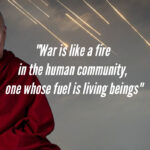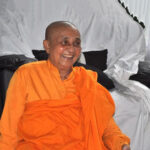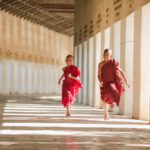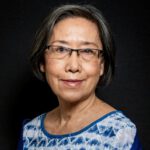
?
May 16 ? June 3, 2011 Davao City,
Mindanao, Philippines
?
?
MPI BACKGROUND
The Mindanao Peacebuilding Institute (MPI) is an Asian training institute grounded in the Mindanao, Philippines context using models developed and adapted for and by Asians. MPI is a resource for peacebuilders: providing skills, conducting research, and building solidarity within the Conflict Trans- formation Framework.
MPI was established in the year 2000 through the collective effort of the Catholic Agency for Overseas Development (CAFOD), Catholic Relief Services (CRS), and Mennonite Central Committee (MCC) to bring together peacebuilders of diverse cultures from the Asia-Pacific Region to participate in its annual peacebuilding training. Since its inception, MPI has been a meeting point of peacebuilders from countries such as Afghanistan, Bangladesh, Cambodia, Canada, Fiji Islands, India, Indonesia, Japan, Kenya, Laos, Myanmar, Nepal, Pakistan, Solomon Islands, South Korea, Sri Lanka, Timor Leste, USA, the Philippines and other countries.
Aside from gaining new practical skills, many participants ascribe equal value to the bonding, friendships, and solidarity that are created among peace advocates from different countries. Indeed, MPI has become a venue where participants strengthen their commitment to peacebuilding work through continuing association with peer practitioners.
In its desire to be a wellspring of peace processes and initiatives, MPI has created a space where peacebuilders meet in mind, heart, and spirit to keep abreast of the challenges which the issues of peace and justice present. In a professional and personal way, MPI, through its programs, offers opportunities by which the journey of peace becomes real in the lives of peacebuilders.
In November 2009, MPI became an independent legal entity in the Philippines. For as long as stories of peace unfold and deterrents to peace exist, MPI stands on its ground as an institution facilitating empowering processes by which peace is celebrated and lived.
Vision
Just and peaceful communities in Asia-Pacific.
Mission
MPI seeks to deepen commitment to justice and peace; respect for human rights; and dialogue and solidarity among individuals, institutions, and communities.
Goal
Individuals, institutions, and communities empowered as catalysts for peace and social transformation.
Objectives
- To educate, train, and build capacities of individuals and their institutions in the field of peacebuilding.
- To refine learning, enhance knowledge, and share materials related to peacebuilding.
- To create space and connect people from diverse sectors to build a critical mass of peacebuilders to promote justpeace.
?
TRAINING PROGRAM 2011 TRAINING PROGRAM 2011
The 2011 training program will last for three weeks and will offer 14 different courses which are divided into foundation, thematic and field exposure courses.
Week 1: May 16 ? May 20, 2011
Foundation Courses
Introduction to Conflict Transformation (ICT)
Wendy Kroeker (Canada) and Ramesh Prakashvelu (India)
This course will present an introduction to the field of conflict transformation with a focus on the theoretical understanding of conflict as well as the development and application of practical skills in this field. Attention will be given to the development of personal communication skills, interpersonal negotia- tion skills, and intervention in organizational and inter-group conflicts. Participants will be expected to engage in discussions, role plays, exercises and case analyses.
Fundamentals of Peacebuilding (FPB)
Paulo Baleinakorodawa (Fiji) and Miriam L. Suacito (Philippines)
This course will explore the challenges and dilemmas of peacebuilding in contemporary protracted and violent conflict. It will focus on the development of a strategic framework for peacebuilding, primarily from the perspective of non-governmental practitioners. Participants will interact with current approaches and theory, with ample opportunity for developing analytic and peacebuilding skills through exercises, simulations, and case studies. Participants will be expected to work in teams on a collaborative application of the framework.
Peace Education: Concepts and Approaches (PECA)
Ofelia L. Durante (Philippines) and Essex Giguiento (Philippines)
Drawing on ideas, perspectives, and experiences from diverse contexts, this course seeks to provide peace education practitioners with a holistic and critical understanding of the concepts and approaches used in peace education. This holistic view of peace means that all forms of violence (physical, social, cultural, economic, political, psychological, structural and environmental) have to be fully considered and transformed. Essentially, the course explores approaches towards the development of a culture of peace as embodied in the UNESCO Programme of Peace which encompasses the specific themes for the formation of the values of peace, conflict resolution, and respect for human rights.
Active Non-violence: Philosophy, Theory and Practice (ANV)
Myla Leguro (Philippines) and Jonathan Rudy (USA)
This course is for people working with community-based organizations, non-governmental organizations, and peace and justice movements, especially those working in or with communities facing protracted violence. It starts with the assumption that people involved in local conflicts have the capacity to make peace, and those peace strategies arising from local initiatives will be more enduring, culturally and contextually appropriate, and require less outside support. The course will emphasize nonviolent approaches promoting self-reliance and empowerment in the local community through application of transformative strategies aimed at resolution of injustices. The course will address: a) different approaches to active nonviolence; b) cultural and religious understandings of nonviolence; c) nonviolent struggle, con
temporary and historical, including violence reduction and resistance; and d) development of nonviolent action plans addressing participants’ focus/nonviolent work. The course methodology will be participatory, including discussion, role plays, case studies, small group work, readings, and videos.
?
Week 2: May 23 ? May 27, 2011
Thematic Courses Thematic Courses
Conflict Resolution Skills: Mediation, Negotiation and Dialogue (CRS)
Paulo Baleinakorodawa (Fiji) and Emmanuel Amancio (Philippines)
Pre-requisite: Introduction to Conflict Transformation
This course will explore the theory and practice of different conflict resolution methods with an emphasis on mediation, negotiation and dialogue. Studies in mediation will focus on the conceptual framework, process and practice of mediation in both interpersonal and group contexts. Discussions in negotiation will explore frameworks and applications for interpersonal and group/community conflicts. Participants also will learn techniques for facilitating dialogue and relationship building between different ethnic and religious groups as a method of conflict resolution.
Theory and Practice of Mediation (TPM)
Wendy Kroeker (Canada) and Jae Young Lee (South Korea)
Pre-requisite: Conflict Resolution Skills: Mediation, Negotiation and Dialogue or an equivalent course or experience
This course requires prior training in mediation and will continue to enhance the mediation skills of participants. There will be opportunities for role plays, class discussion, small group work and specific skill learning activities. The focus areas will be advanced mediation techniques, multi-party conflicts from a number of different aspects, conflict analysis skills, and exploration of the uses and challenges of mediation. There also will be a brief presentation on restorative justice and its relationship to mediation. This course is primarily for persons who have an understanding of and experience in mediation.
Religion: Peacebuilding in Multi-Cultural Societies (REL)
Jonathan Rudy (USA), Alzad Taradji Sattar (Philippines), and Maria Ida L. Giguiento (Philippines)
Pre-requisite: Any Week 1 Foundation Course
This course will provide an overview of the issues and approaches of religion as it relates to conflict and peacebuilding. It will explore faith-based ways of believing and acting that divide, and then develop the participants? capacities to respond constructively and effectively to such behaviors. It will then explore the diverse roles performed by religious peacebuilders and the underlying values, assumptions and factors that shape peacebuilding methodologies. Skill building will include dealing with religious diversity, including prejudice and stereotyping. This course also seeks to examine the issues and approaches of religion as it relates to conflict and peacebuilding. It will help participants develop an awareness that is both appreciative and critical of the resources and ethical responses of the various religious traditions and/or spiritual practices to conflict, peace and conflict transformation.
Trauma Healing and Reconciliation in Divided Communities (TH)
Al Fuertes (Philippines/USA) and Miriam L. Suacito (Philippines)
This course attempts to address the following questions: a) What is trauma? b) How does trauma affect individuals and communities? c) What helps people survive the trauma? d) What are the sources of their strength? e) What does healing mean? f) What does reconciliation require so that divided communities will live together again?
In this course, the participants will understand the nature and dynamics of trauma and the promise of healing and reconciliation. Specific cases of armed conflict, resulting in internal displacements, as well as cases of natural disaster, domestic violence and abuse will be examined. Participants will also have the opportunity to maximize the potential for resiliency and healing mechanisms in light of such traumatic events. In addition, they will explore new skills and approaches to healing and reconciliation from different cultural perspectives.
Working Towards Change: Peace and Justice Advocacy (WTC)
Myla Leguro (Philippines) and Ramesh Prakashvelu (India)
Pre-requisite: Any Week 1 Foundation Course
This course aims to assist participants in developing a shared understanding of advocacy and its relationship to the overall vision of working for peace and justice. This course will provide participants an opportunity to explore the questions: a) What is advocacy? b) What are some basics of advocacy work? c) What are some common assumptions and approaches in doing peace and justice advocacy work? d) What are some core areas of competency that help in peace and justice advocacy work?
Aside from enhancing participant?s knowledge about advocacy as an effective mechanism and process for change, the course will also provide skills in the basics of designing advocacy initiatives. This approach to advocacy capacity-building requires not only learning how to change policy, but also being aware of and changing the values and structures that exclude people and perpetuate poverty and injustice. From this perspective, advocacy planning and action aim to empower and engage citizens in the continuous task of making public decision-making more inclusive, responsive, fair, and accountable, and in building relationships of cooperation and solidarity.
?
Week 3: May 30 ? June 3, 2011
Themat
ic Courses Thematic Courses
Gender, Peace and Everyday Life Security (GP)
Chan Shun-hing (Hong Kong, China) and Chan Wai-fong (Hong Kong, China)
In today?s world, violence, may it be bodily, structural or cultural, permeates the lives of individuals, their communities and the environment. To make sense of the connections of different kinds of violence so as to engender change through possible actions, that is, to develop a politics of peace, it is necessary to see the ?ordinary? context of the everyday where violence is perpetuated by social, economic, and cultural forces and exerts an increasing impact on women.
This course aims to re-articulate the concept and politics of peace by examining on the one hand, different forms of violence and in particular the conflicts of development arising from neo-liberalism and unjust policies, and on the other, the actual practices of women as agents of change in cultivating peace and everyday life security by negotiating with such violence.
Cases of women in Mainland China, Taiwan, and Hong Kong engaging in such peace processes will be used to discuss subjects such as ecology, livelihood, community building, and gender/sex relationships. Issues of sustainability of peace will be highlighted by focusing on women?s way of knowing that is experimental, responsive to the call of nature, care-oriented, and rooted in traditions and indigenous culture. The course will be conducted in an interactive way using different methods and resources, including audio-visual materials and participatory workshops.
Advanced Civilian Protection (ACP)
Suzanna Tkalec (Croatia/Italy); Co-Facilitator to be announced
The Advanced Civilian Protection Course will provide participants with knowledge and skills for assessing protection needs affecting groups and individuals of concern and develop adequate programming responses. It also will provide participants with an overview of the legal framework which identifies the people who ought to be protected, the laws that demand their protection, and the authorities that are required to provide it. International human rights, humanitarian and refugee law is an important backdrop to protection. It sets standards for the way people should be treated; and it can sometimes be used to persuade the relevant authorities to take action to protect people.
The training will focus on strengthening participants’ skills and knowledge to take very real and practical actions to improve the safety of civilians. It will explore a practical approach to programming for protection and examine the links between protection and assistance through real case studies. Participants will learn how to carry out a protection assessment and analysis as the basis for designing a protection program. It will build participants skills for collecting sensitive data, documentation of human rights abuses, lobbying or advocacy, monitoring and evaluation, and surveys. The Advanced Civilian Protection Course is directed to practitioners and mid-career professionals working with community-based organizations, NGOs, government offices and UN agencies.
Field Exposure Courses Field Exposure Courses
The MPI field-based exposure courses will draw on the diversity of peacebuilding initiatives present in Mindanao, Philippines and help participants consolidate the classroom-based learning of the previous two weeks. Participants will be expected to live and interact in the community and gain an understanding of the different strategies used and the successes and challenges encountered as communities and peace practitioners strive to transform conflict. MPI will tap its partners in different areas of Mindanao to facilitate these courses. In order to maximize impact, each course will be limited to a maximum of 15 participants.
Indigenous Peoples? Peacebuilding Mechanisms (IPPBM)
MPI Partners
This field exposure course will focus on the practices of Indigenous Peoples in Mindanao, collectively referred to as Lumad, how they look at peace, and what community mechanisms and processes are employed to ensure that peace is maintained in the community. It will include discussions on indigenous dispute resolution mechanisms with indigenous peoples? leaders themselves as Resource Persons right in their own community. This course also will explore critical questions related to the effectiveness of indigenous ways of resolving conflict when communities are faced with external threats such as the battle for natural resources on their ancestral domains.
Approaches to Grassroots Peacebuilding: Interreligious Dialogue and Zones of Peace (AGPB)
MPI Partners
This field exposure course will focus on two emerging grassroots peacebuilding initiatives in Mindanao, Philippines ? interreligious dialogue and the zones of peace. These initiatives concretely strengthen and sustain the participation of local people and communities in reducing violence, rebuilding relationships, and transforming conflict.
Visits will be to communities in Central Mindanao which have experienced sectarian violence and have undertaken community-based peacebuilding processes. Participants will have the opportunity to engage with key leaders and local people to learn from their experiences, lessons, and challenges in undertaking dialogue and peace zone efforts.
People?s Participation in Peace Processes (4Ps)
MPI Partners
This course will focus on the initiatives of public and civil society members in peace processes in Western Mindanao, Philippines, their engagement with government and other peace and conflict actors, and their impact and responses to the conflict between the Government of the Philippines and revolutionary groups. By interacting with various actors involved in these peace processes, the participants will become aware of the various peacebuilding frameworks used in different contexts. At the end of the course, the participants will generate relevant lessons and insights as they relate the experiences to their own situations and communities.
?
GENERAL INFORMATION
?
Admissions Criteria Admissions Criteria
- Ability to communicate in English (oral and written).
- At least two years experience in peacebuilding, or in the related areas of development and human rights.
- Clearly outlined
objectives/strategies for applying the learnings and skills from MPI to one?s work situation or specific context to be outlined in a Statement of Intent. (See application form.) - Individuals must be mature and committed to fully participate in the courses.
- Openness to dialogue with people of other faiths and cultures.
- Physically fit and willing to immerse in community contexts (for those who will enroll in the field exposure courses).
?
Application and Course Fees Application and Course Fees
Rates per course are as follows:
| CLASSIFICATION | Application Fee | Course Fee |
|---|---|---|
| International organizations based outside the Philippines | US$ 50 | US$ 550/week |
| International organizations based in the Philippines | PhP 500 | PhP 18,000/week |
| Philippine organizations/institutions | PhP 500 | PhP 13,500/week |
The non-refundable application fee of PhP 500 for local participants and US$ 50 for international participants is required per participant. Please note that the course fee includes cost of accommodations, meals, course materials and other course-related costs.You may transfer your application fee to the following bank accounts:
| DOLLAR ACCOUNT | PESO ACCOUNT | ||||||||||||||||
|---|---|---|---|---|---|---|---|---|---|---|---|---|---|---|---|---|---|
|
|
For payment of the course fees, please wait for the billing statement that will be sent after the receipt of your application. After transferring your application fee and course fee to the accounts indicated above, please scan a copy of the transaction slip and e-mail it to the address indicated or fax the details of the transaction to MPI. This is a must for the issuance of a receipt and for our records. Bank charges for electronic payments should be shouldered by the payer.
Food and Lodging
Meals are covered in the costs of the course. Accommodations are simple and dormitory-style with several people in one room. Please note any special dietary needs on the application form. Those interested in off-campus accommodations may do so at their own expense. MPI will provide a list of hotels and contact details upon request.
Travel Costs, Medical-related Costs and Visa Assistance
Travel and medical-related costs are the responsibility of the participants or sponsoring organizations. The Institute will only cover travel costs for the Field Exposure Courses. If help is needed in obtaining a visa to the Philippines, please indicate this on the application form.
Classes
Class numbers will be limited to 25 participants per course on a “first come, first served” basis. So, it is important that you select alternates in case your first choice is not available. Course materials and handouts will be provided. Classes will be from Monday to Friday and are typically from 8:00 am until 5:00 pm, with lunch and coffee breaks. Participants are encouraged to interact and socialize with other class members in their free time.
Venue
The MPI Annual Training will be held at the Brokenshire Resort and Convention Center, Brokenshire Heights, Madapo, Davao City, Philippines.
Registration
Registration will be held between 15:00 ? 17:00 on May 15, May 22, and May 29 at the lobby of the Brokenshire Resort and Convention Center. We discourage registration on the first day of the course to avoid class interruption.
Groups
MPI encourages those coming in groups to select a delegation head for direct and easier coordination. In order to maximize the learning opportunity, group members are encouraged to choose separate courses.
Social Events
Participants are invited to prepare a country presentation, with focus on the culture of their country. This will be an opportunity to feature national costumes, music and dances. Please bring things representative of your country/cultural community to which you belong, such as: clothing, musical instruments, handicrafts, poetry, songs, posters, brochures, photos, peace banners, country flags and videos. These events will be scheduled in the evenings during the week.
Outings (e.g., trips to the beach or other places of interest) will be organized during weekends at a cost to the participants. These announcements will be posted during the training. Costs related to these trips are not included in the fees.
PLEASE NOTE:
- Only applications with completed requirements will be processed.
- Applicants who have been accepted will be notified by a confirmation letter and billing statement from MPI. Waitlisted participants also will receive notification. Cancellation of an application must be done 3 weeks before the training to allow waitlisted participants to take the slot/s.
- MPI reserves the right to collect a corresponding fee if cancellation is not done within the prescribed period.
The deadline for receipt of applications is March 15, 2011. Applications should be sent to this email address: mpi@mpiasia.net Notification of acceptance will be sent out in early April via e-mail or fax. If you have any questions, please feel free to contact us at:
4th Floor, MTRC Building 2, Davao Medical School Foundation Compound
Medical School Drive, Bajada, 8000 Davao City, Philippines







